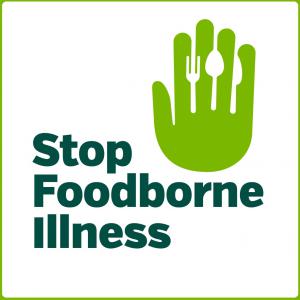Safe Meal Prep and Storage During Coronavirus:
STOP Foodborne Illness CEO urges consumers now more than ever to be vigilant with food preparation and storage!
CHICAGO, IL, USA, April 2, 2020 /EINPresswire.com/ -- With the media encouraging consumers to stock up on food and supplies and prepare food at home during the coronavirus pandemic, food safety is paramount. Mitzi Baum is the CEO of STOP Foodborne Illness, the only national public health organization whose mission is to support and engage people directly impacted by foodborne illness and mobilize them to help prevent illness and death by driving change through advocacy, collaboration and innovation.Comments Ms. Baum, "Older adults, pregnant moms, babies and small children, and immune-compromised individuals are at greater risk to contract a foodborne illness from improperly prepared or stored foods. In reality, we are all susceptible to the dangerous foodborne illnesses that nationally cause 3,000 to die each year with another 128,000 hospitalized, many of whom continue to suffer from ongoing consequences including heart disease, diabetes, gastro issues, and stress disorders. The very first advice we petition all to practice is that of thoroughly washing one’s hands before, during, and after food preparation with warm water and soap.”
STOP Foodborne Illness, a national, nonprofit, public health organization dedicated to preventing illness and death from foodborne pathogens, offers concerned consumers tips for reducing the risk of foodborne illness during this chaotic time. Here are four reminders to help you prevent foodborne illness in your home.
1.) Store foods at safe temperatures. When coming home from a frantic trip to the grocery store, it is easy to forget which foods need to be refrigerated, which need to stay frozen, and which should be stored in a dry, cool place. Check the packaging on your purchased items before stowing them away. Bacteria thrives in the danger zone, which is between 40° F - 140° F. According to the United States Department of Agriculture, we must “always keep meat, poultry, fish, and eggs refrigerated at or below 40 °F and frozen food at or below 0 °F.” Frozen foods left out on the counter will thaw. If left out for more than 2 hours, they must be discarded. For more detailed USDA food storage standards, visit: Keeping Food Safe During an Emergency
2.) Prepare foods, especially meat, safely. Once you know you’ve properly stored all of your groceries, you can begin to work on safe food preparation. The USDA does not recommend washing meat, poultry, or eggs. While the intention may be to wash off any harmful pathogens, the reality is that water splashed from these foods will contaminate kitchen surfaces, or worse, other food. Your hands, however, should be thoroughly washed. Before, during, and after preparation, sing the ABC’s (for 20 seconds) while using soap and water to scrub those five-fingered germ carriers clean!
SAFE INTERNAL TEMPERATURE FOR MEATS AND POULTRY
MEAT / POULTRY TEMPERATURE*
Poultry – Whole and Ground 165 °F in thigh, wing, and breast
Burgers and ground meat 160 °F
Whole cuts of beef, pork, other meats 145 °F (rest for 3 minutes before serving)
Fish and Seafood 145 °F
*Color and aroma are not indicators of safely cooked food. The only way to ensure your meat, poultry, and eggs are safely cooked is to use a meat thermometer. For tips on purchasing a food thermometer, visit www.stopfoodborneillness.org
3.) Keep your kitchen space uncrowded and clean. Keeping your kitchen clean may seem like an impossible task, especially with kids running around your ankles and groceries up to your ears. However, a clean prep space is vital to safe food preparation. Step up your campaign against germs by cleaning, sanitizing, and disinfecting with every use of the kitchen. Regularly replace sponges and dish towels, or clean them with hot water. Sanitize all kitchen surfaces that hands may touch, including countertops, sink faucets and knobs, sink drains, and cutting boards. Above all, keep your hands clean! Wash your hands throughout preparation, and especially right before you eat. For more thorough guidelines on cleaning your kitchen, reference Quick Facts: Clean, Sanitize, & Disinfect.
4.) Prepare and eat leftovers in a timely manner. Everyone loves leftovers. Lunch or even tomorrow’s dinner just became that much easier. If leftovers are properly sealed away within 2 hours of being out at room temperature, they can be refrigerated for up to 4 days. If you anticipate that there will be more than 4 days between meals, pack your leftovers away in airtight containers and place them in the freezer.
In summary, be careful how you store your food, prepare your food, maintain your cooking spaces, and approach leftover meals. The coronavirus pandemic has many consumers afraid for their families, friends, and own personal well-being. Stop Foodborne Illness claims no cure for this particular condition; however, we are optimistic that certain preventative measures can be taken to counteract foodborne illness during this sensitive time.
For more food safety tips please visit www.stopfoodborneillness.org/awareness. If you think you have been sickened from food, reference our page, Do I Have Foodborne Illness? and contact your local health professional.
Based in Chicago, STOP Foodborne Illness (NFP) is the only national nonprofit public health organization whose mission is to support and engage people directly impacted by foodborne illness and mobilize them to help prevent illness and death by driving change through advocacy, collaboration and innovation. For more information: https://stopfoodborneillness.org.
###
Dori Wilson PR for
STOP Foodborne Illness
+1 312-965-7575
email us here
Legal Disclaimer:
EIN Presswire provides this news content "as is" without warranty of any kind. We do not accept any responsibility or liability for the accuracy, content, images, videos, licenses, completeness, legality, or reliability of the information contained in this article. If you have any complaints or copyright issues related to this article, kindly contact the author above.

